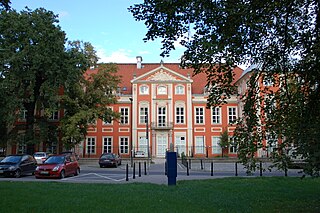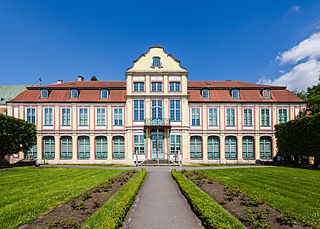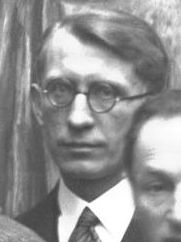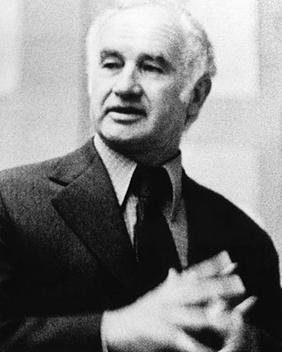
Jarosław Kukowski is a Polish contemporary painter, juror of international art competitions. His works were exhibited, among others Branch Museum of the National-Królikarnia Salons Rempex Auction House, the Museum of Galicia, the Contemporary Art Gallery, Castle Voergaard, the Art Expo New York and many other galleries and museums in the world. He is considered one of the most influential contemporary creators of the Surrealist circle.

Krzysztof Michał Bednarski (KMB) is a contemporary Polish-Italian sculptor.

The Zachęta National Gallery of Art is a contemporary art museum in the center of Warsaw, Poland. The Gallery's chief purpose is to present and support Polish contemporary art and artists. With numerous temporary exhibitions of well-known foreign artists, the gallery has also established itself internationally.

The Warsaw National Museum, also known as the National Museum in Warsaw, is a national museum in Warsaw, one of the largest museums in Poland and the largest in the capital. It comprises a rich collection of ancient art, counting about 11,000 pieces, an extensive gallery of Polish painting since the 16th century and a collection of foreign painting including some paintings from Adolf Hitler's private collection, ceded to the museum by the American authorities in post-war Germany. The museum is also home to numismatic collections, a gallery of applied arts and a department of oriental art, with the largest collection of Chinese art in Poland, comprising some 5,000 objects.

Anna Bilińska was a Polish painter, known for her portraits. A representative of realism, she spent most of her life in Paris, and is considered the "first internationally known Polish woman artist."

Academy of Fine Arts in Warsaw is a public university of visual arts and applied arts located in the Polish capital. The Academy traces its history back to the Department of Arts founded at the Warsaw University in the Duchy of Warsaw in 1812. As a separate institution it was founded in 1844 in Congress Poland. In an upgrade in 1904 it was named the Warsaw School of Fine Arts; and in 1932 it received recognition as an Academy. At first the institute did not have its own building and classes were held in several locations around the city. Following an architectural competition a design by Alfons Gravier was chosen and construction began in 1911. The building was completed by the outbreak of the First World War.

Konstanty Laszczka was a Polish sculptor, painter, graphic artist, as well as professor and rector of the Jan Matejko Academy of Fine Arts in Kraków. Laszczka became the Rector of the Academy in 1911, however, for family reasons he resigned from this function in 1912.
Zuzanna Janin, is a Polish visual artist and former teenage actor. Janin lives and works in Warsaw and London. Janin has created sculpture, video, installation, photography and performatives. She used the names Zuzanna Baranowska (1990-1992) and from 1992 Zuzanna Janin. Her work was shown in the Museum of Contemporary Art, Chicago; and A.I.R Gallery New York. She is included in Feminist Artists Data in Brooklyn Museum, NY.

The Abbots' Palace in Oliwa is a rococo palace in Oliwa, a quarter of Gdańsk. It houses the Department of Modern Art of the National Museum in Gdańsk, and along with the Cistercian-Cathedral complex in Oliwa it is listed as a Historic Monument of Poland.

Samuel Finkelstein (1895–1942) was a Jewish oil painter in the interwar Poland who died at the Nazi death camp Treblinka during the Holocaust.

The "Łaźnia" Centre for Contemporary Art is a municipal cultural institution and art gallery in the Dolne Miasto district of Gdańsk, Poland, located in the abandoned municipal bathhouse. The word "łaźnia" means "bathhouse" in Polish.

Barbara Massalska was a Polish artist and teacher at the State High School of Plastic Arts (SHSPA), Gdańsk.
Paweł Kowalewski – is a Polish artist, member of Gruppa, pedagogue, founder of the Communication Unlimited agency.

Franciszek Duszeńko was a Polish sculptor, professor of the Academy of Fine Arts in Gdańsk and its Rector in the years 1981–87. He was a former prisoner of Nazi concentration camps in World War II.
Ewa Doroszenko is a visual artist working in photography, painting and multimedia installations based in Warsaw, Poland. She received her Doctorate in Fine Arts from the Nicolaus Copernicus University in Torun, Poland. Doroszenko's main interest is in the intersection area between these practices.

Bogusław Bachorczyk is a Polish painter, draftsman and sculptor.
Katarzyna Karpowicz is a Polish contemporary painter.

Wiktoria Julia Jadwiga Goryńska was a Polish painter and graphic artist.

The Academy of Fine Arts in Gdańsk was founded in 1945 in Sopot, Poland as the State Institute of Fine Arts, later renamed the State College of Fine Arts in Gdańsk. In 1954, the headquarters were moved from Sopot to Gdańsk, to the rebuilt Great Armory. In 1968, the university gained a new, modernist wing designed by the university professor Ryszard Semka. Since 1996 it has had the status of an Academy of Fine Arts.

The Society for the Encouragement of Fine Arts in Warsaw was an independent arts organization founded in Warsaw, then Kingdom of Poland, in 1860.

















